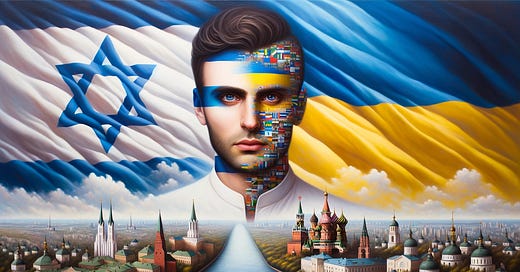
If you’re both Israeli and Ukrainian, ‘tis the season for concerned messages from new friends and old relatives. The messages arrive in technological parcels with geographical logic: WhatsApp from Israelis and Europeans, Viber from Ukrainians, Telegram from Ukrainians who need extra encryption (also your neighborhood mushroom dealer), iMessage from Americans.
I’ve experienced this twice now. Once when Russia pulled some 18th century warlord shit last February, and once last Saturday, when Hamas decided to advance the Palestinian cause by literally murdering babies. The messages, a flood at first, then a slow drip, come with a bundle of emotions. First, a gust of joy or excitement to see the name of a loved one or an old friend. Second, curiosity. What are they up to? How are they processing this? What’s going on in their lives?
And third, guilt. As someone living abroad, far from both Ukraine and Tel Aviv, I don’t feel like I deserve the thoughts and the concern. I don’t sit in bomb shelters. I’m not at risk of being drafted. My family is safe both in Israel and Ukraine (for now). But more than anything, I feel guilty for not feeling more hurt for my people and my countries.
Stalin liked to say that the death of one man is a tragedy, but the death of a million is a statistic. I think about that a lot and when these things happen, I find myself scrolling through newsfeeds voraciously, looking not for explanations or geopolitical takes but for personal stories. It’s impossible for me to process what it means for 2,000 civilians to die, so I strive to feel the hurt and the fear of one person, what they must have thought, what they said or how they acted in the face of insidious terror.
I feel it in fits and starts, and maybe even tear up sometimes but after a while I get numb to that too. It’s the mind telling the heart to feel, and that’s just not how the heart works.
It took a while to feel into why: I was so tired of suffering.
Being born Jewish embeds you into a rich tradition of suffering. For most of the world, the Holocaust came to define antisemitism. But if you’re Jewish, that’s just the culmination of thousands of years of Jewish hatred. If you celebrate any of the Jewish holidays, you figure out eventually that most of them are celebrations of the fact that our ancestors survived attempted massacres. You learn about the Russian pogroms, the mass expulsions from Spain, the Inquisition, alongside the specific stories each family holds in its rich trove.
And if you’re Israeli, like me, you grow up surrounded by terror attacks on buses and restaurants, rockets raining down, civilians slaughtered. It ebbs and flows with political tides, sure, but it never goes away. You get used to it.
And if you’re Ukrainian, you’ve got the legacy of Eastern European history to contend with. In a region where human life was worth so little, tyrants ruled with unchecked power. Subjects (for they were certainly not citizens) were at best cannon fodder for lengthy wars, and at worst the direct target of blood-thirsty tsars who feasted while their people starved. The bloody streak of the Russian Civil War, the terrors of the Soviet Union and the lawlessness of the 1990s were not historical anomalies but a continuation of a legacy of misery that is hundreds of years old. It is no coincidence that some of the most poignant literature on human suffering came from Russia.
And so my response, my numbness, seems to me now like a defense I wove in response to the collective tragedies that permeate every part of my history — and my present too. Unable to bear my homelands’ tendencies toward pain, I turned away. Or maybe it’s more accurate to say that I turned forward: into the future, focused on building a safe and unshakeable foundation far away. Not just geographically but far away from my identities too, as if assimilating with the AI- generated average human face will hide me from my peoples’ past.
This defense disengaged me from the news — what suffering can they expose that my peoples haven’t already seen? — and I would respond with shrugs and silence when politics was being discussed.
It strikes me now what a colossal loss it is to stop feeling pain. Within it lives a grief that runs generations deep. But within it hides love too, and compassion, and deep care for the lives of others. And within it hides gratitude for what the suffering stands for, what those suffering stand — and live and die — for.
In a world that felt unsafe for most of my life, I escaped, and then blocked it out, mostly. But now I feel safe. And my homelands are under attack.
Could it be that I am ready to feel again?



Beautiful mate.
Thank you brother